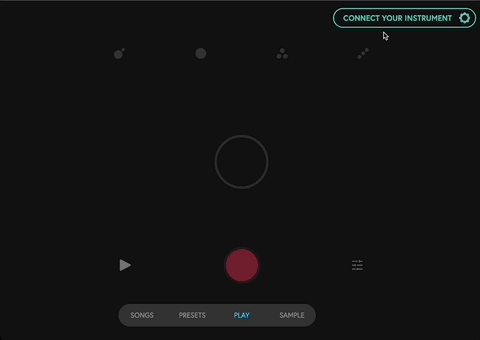
How to use Chorda as a MIDI Controller with GarageBand: Tips & Tricks
Written by: Maya Wagner - Artiphon's Product Marketing Associate
Want to watch instead of read? Check out the video version of this post here:
Chorda is designed to integrate seamlessly with DAWs like GarageBand, unlocking a realm of possibilities. Its core features effortlessly optimize your workflow by connecting easily, enabling one-finger chords and easy arpeggios, and adding more expression than a traditional MIDI keyboard.
In this post, we’ll cover how to use Chorda as a MIDI controller with Apple’s GarageBand, from getting connected to finding the perfect sounds for your next masterpiece.
How to Connect Your Artiphon Chorda to GarageBand
Start by connecting Chorda to your computer. The simplest way to do this is to connect via USB-C cable. Connecting via Bluetooth takes a few extra steps, so let’s go over that.
- Open the Artiphon Connect app, and navigate to Settings in the upper right.
- In the connect toggle section, cClick on “Bluetooth,” and click “Connect”.
- Find your Chorda in the list of available Bluetooth devices, and click “Connect.”

Note: If you’re using Chorda as a MIDI controller, chances are you won’t need to hear the onboard sounds coming from Chorda’s speaker, so you can simply turn Chorda’s volume all the way down using the blue volume buttons on the side. This won’t affect Chorda’s volume when connected to your DAW, or its ability to be used as a controller.

- Now that Chorda is connected, open GarageBand and create a new project. You’ll get a pop-up to choose a track type.
- Choose “Software Instrument,” as shown below.

GarageBand automatically loads the Classic Electric Piano patch. When you tap a pad on your Chorda, you should hear the Electric Piano!
Try: Gestures
The first thing to try is using gestures with GarageBand sounds!

The Electric Piano patch responds to the Mod Wheel MIDI message. If you’ve ever used a classic keyboard or MIDI controller with a Mod Wheel, you may have noticed that most synth patches will respond when the Mod Wheel is activated.
You may be asking Artiphon why are you going on this side rant? This is what makes our instruments so powerful – Hear us out!
Well, Chorda’s Tilt gesture sends the Mod Wheel message, so if you Tilt Chorda when playing the Electric Piano, you should see the Tremolo knob moving in the controls panel, and hear the sound changing. 😱

The Tilt gesture works like this with tons of the built-in GarageBand sounds, so definitely play around with it on different sounds and see what you get!
Try: Chords
The second thing to try is Chord mode!
A chord is when multiple notes are played together to create harmony, just like when you play multiple notes at once on a keyboard.

The awesome thing is, Chorda has a Chord mode that does this for you, but all you need is one finger! So no need for finger yoga just yet.
This is great for creating chord progressions in GarageBand super easily, even if you are not familiar with music theory. (That’s right!)
When you press a pad in Chord mode, GarageBand actually receives four notes!

Try: Drum Patterns
Next up: drum patterns!
Chorda’s Drum mode will trigger different sounds in GarageBand drum kits.
You can take Drum mode a step further by turning on the Arpeggiator. You do this by holding (A) and pressing Pad 6 (ARP).
In Drum mode, Chorda’s arpeggiator creates different drum patterns for each pad depending on where your finger is placed on a given pad. Phew! No need to wait for your late drummer any longer!
Try putting the arpeggiator on in Drum mode and recording different drum patterns into GarageBand. You can use the Radiate gesture to change the speed of the pattern!

If you’re new to this world, we’ve created an easy-to-use free GarageBand template that you can download here.
We hope this blog post and video help optimize your musical production. Can’t wait to see what you make! Don’t forget to @Artiphon or #orbaloops #chordaloops for a chance to be feature in our Community Highlights page!

